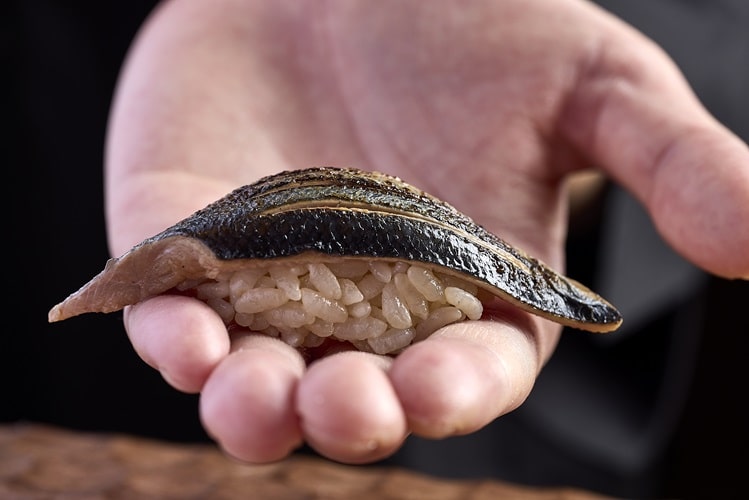Second branch follows on heels of AIRSIDE debut, heralding the arrival of sensational winter seafood delicacies from Japan and
enticing premium sake flight
Hong Kong) Uogashi Nihonichi, the renowned Japanese fresh fish specialist, has unveiled a second Hong Kong standing sushi bar, in Central Market, following its successful arrival at AIRSIDE in Kai Tak last September. True to its fish-market heritage, Japan’s beloved chain of casual, cosy and convivial Edomae-sushi establishments takes a prominent spot in the revitalised former wet market, presenting authentic sushi crafted from premium seasonal seafood, affordable omakase sets and an artfully curated sake flight.
The new Central branch, which jumpstarts plans for a major expansion throughout Hong Kong, offers a more vibrant and eclectic vibe compared to the minimalist aesthetic of its AIRSIDE sister. Colourful wall hangings and ceiling pendent lamps resembling iconic fish-shaped soy-sauce containers illuminate an inviting dark-wood-panelled sushi bar, where 20 tall stools give diners the option to sit or stand.
The winter season in Japan heralds a myriad of fish and shellfish delicacies that arrive on the sushi counter at their plumpest and freshest. Uogashi Nihonichi brings these coveted catches from Japan’s clean waters and famed fish markets to Central Market, where they top quality rice from Japan in immaculate sushi showcasing the natural flavours and textures of the seafood, or shine alone as sashimi.
The year-round favourite of Kinmedai (Splendid Alfonsino) from Hokkaido (sushi HK$68, sashimi HK$118) deepens in taste as the sea gets colder, revealing delicate, tender flesh full of umami flavours. The subtle Kawahagi (File Fish) from Ehime (sushi HK$68, sashimi HK$118) becomes a creamy, intoxicating gem when topped with its own liver in nigiri-sushi; and the deep-ocean Kuromutsu (Japanese Blue Fish) from Kochi (sushi HK$68, sashimi HK$118) is a rich, fatty, marbled delight.
Succulent and juicy Oysters (HK$88) farmed in Nagasaki Prefecture are most prized in winter, while Iidako (Baby Octopus) from Kagawa (HK$118) bursts with the flavours of its native Kagawa – the seasonal meat of the roe-bearing females impart plenty of protein and taurine and are especially delicious.
These winter wonders may grace the deluxe Omakase Set (HK$688), which spans four pieces of sashimi and seven Edomae sushi, as well as a handroll and chawanmushi, while sushi lovers will revel in the 10 types of seasonal seafood plus a handroll that comprises the Sushi Omakase Set (HK$398). Both value-added omakase sets are served with the special miso soup of the house, slow-cooked daily with fresh chicken and sea bream into a rich, savoury broth.
Seafood lovers who are looking for a lighter meal option can sample their favourite fresh-fish cuts in the Sashimi Set (HK$228) or enjoy them flash-fried, sealing in the flavour, in the Seared Sushi Set (HK$248).
The hearty donburi that comprises Uogashi Nihonichi Central’s lunch offerings are priced from HK$158, including a bowl of the signature miso soup. Served from 12 noon to 2:30 pm, these sets feature favourites like wagyu, eel, salmon skin and hamachi to satisfy the palates of the Central lunchtime crowd.
They are headlined by melt-in-the-mouth Wagyu Beef with Uni Rice Bowl (HK$268), while seafood sets include King Crab Meat Rice Bowl (HK$228) and Sea Eel Rice Bowl (HK$178). Avocado Tuna Rice Bowl (HK$198), Quinoa Shallot Crispy Salmon Skin Rice Bowl (HK$158) and Hamachi Caramelised Onion Rice Bowl (HK$158) pair divergent ingredients in temping textural combinations.
Sipping sake while interacting with the sushi maestros as they ply their craft with skilful precision adds to the sensory pleasures of dining at Uogashi Nihonichi, and the in-house sake sommelier selects three bottles from the well-stocked shelves for an enticing Sake Flight, priced at HK$88 per person for a glass of each kind.
From January to March 2024, sake lovers are invited to taste Fukuju Junmai Ginjo from Hyogo Prefecture, which was served at the annual Nobel Banquet in Sweden and is loved for its roasted chestnut flavours; and the smooth, fresh and fruity Nigata pour of Manotsuru Junmai Ginjo, blessed with delicate acidity. The flight is rounded off by Shichiken Furinbizan Junmai, a refreshing and well-balanced brew named after the beauty of Mount Kaikoma in Yamanashi that shows green apple, nectarine and hints of oats and nuts.
Other sake recommendations from a comprehensive list include two giants from Osaka: Daimon 55 Junmai Ginjo (HK$218/300ml) from the award-winning craft brewery acclaimed for its pure mountain water and the low temperature, longer fermentation of its ‘ginjo’ production method; and Rikyubai Hanzaemon Junmai Daiginjo (HK$588/720ml), a new release praised for its herby nose, sweet hints of mangosteen and persimmon, and elegant finish. The cool, crisp unpasteurised sake of Hiokizakura Yamashitataru Nama Junmai (HK$488/720ml) from Tottori Prefecture is a must for those seeking a less sweet tipple with high acidity.
Exclusive at Central Market, the drinks list also features a range of premium Japanese whisky and gin. Beer by the bottle (Suntori, HK$62) and can (Orion Shokunin Wheat Beer, HK$62), and Chu-hi (Sochu Highballs, HK$48) in the enticing flavours of Aomori Apple, Hokkaido Melon and citrusy Hyuganatsu will also quench alcoholic thirsts, while Japanese Cider (HK$38) infused with Ripe Peach, Muscat Grape, Apple or Yuzu, as well as Marble Soda (HK$32) are among the popular soft drinks.
With ‘uogashi’ meaning fish market in Japanese, Uogashi Nihonichi prides itself on presenting fresh fish in seven ways: freshly caught, grated, boiled, baked, fried, cooked and squeezed. By adhering to this philosophy, their talented sushi chefs ensure that each morsel is a simple crafting of pure, firm rice and fish that delivers an authentic and satisfying sushi experience.
Brought to the city last year by Cafe Deco Group in the Japanese chain’s first foray overseas, Uogashi Nihonichi is famed for its convivial stand-up sushi dining. Launched in 1989 in Tokyo’s Shimbashi Station, it now operates 29 branches across Japan dedicated to reviving the 200-year-old “sushi stand” culture. It is also one of the few sushi restaurants in Japan’s top fish markets that has auction rights.




